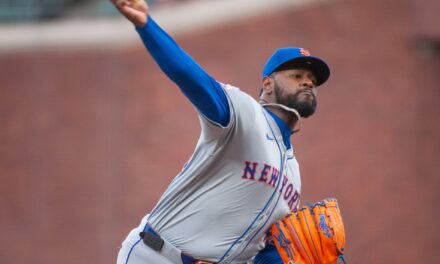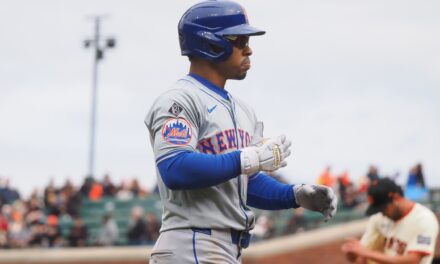In recent years, the Mets have faced a persistent issue behind home plate: inconsistency. Initially, they struggled to find a reliable cornerstone for the position until Francisco Alvarez arrived. However, an old problem with different people emerged, particularly concerning the defensive prowess of their catchers. It seems whoever takes on this role struggles to thwart opponents’ attempts to steal bases. This has been an issue all season but was glaringly evident in yesterday’s game against the Rays.
The Mets currently lead the league in stolen bases allowed, a staggering 52. They have allowed 16 more stolen bases than any other team this season. The Rays ruthlessly exploited the Mets’ weakness, capitalizing on every opportunity to run, especially with the Mets walking nine hitters. The Rays managed to steal seven bases out of eight attempts, showcasing the Mets’ vulnerability, particularly with Omar Narváez (3-for-3) and Tomás Nido (4-for-5) behind the plate.

Mandatory Credit: Jonathan Dyer-USA TODAY Sports
The culmination came in the 10th inning when Jose Caballero stole his fourth base of the game, setting the stage for Jonny DeLuca‘s game-winning triple. Despite Nido throwing out Amed Rosario at second, it was only the third runner caught stealing by a Mets catcher all season. Nido, while showing some prowess, has allowed an alarming 80% of attempted steals, while Narvaez’s numbers are even worse.
Last year’s performance was no better, with Narvaez allowing 92% of steals. Even Alvarez, before his injury, struggled to contain base stealers. Collectively, the Mets’ catchers have an alarming 94.5% success rate in stolen base attempts against them, a concerning statistic given the time frame.
Similarly, the pitching hasn’t fared much better in this aspect. The Mets find themselves atop the league in walks allowed, totaling 155, providing ample opportunities for Tampa to exploit their weaknesses on the base paths. Yesterday, Mets’ pitchers issued a staggering eleven walks, with Luis Severino particularly struggling, conceding six walks in just five innings. Despite his promising previous outing, Severino’s performance fell short, giving up four earned runs along with the high walk count.
While the pitching staff has showcased competence overall, the combination of excessive walks and the lack of defensive prowess behind the plate exacerbates the issue. This game mirrors a concerning pattern for the Mets rather than standing out as an isolated incident.
Their consistent struggle to contain opponents’ running game places them in constant defensive jeopardy, significantly impacting the runs conceded. With a subpar record, the Mets’ postseason ambitions heavily rely on their capacity to rectify this critical weakness by improving their pitching control and ability to contain base runners.
















